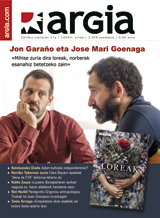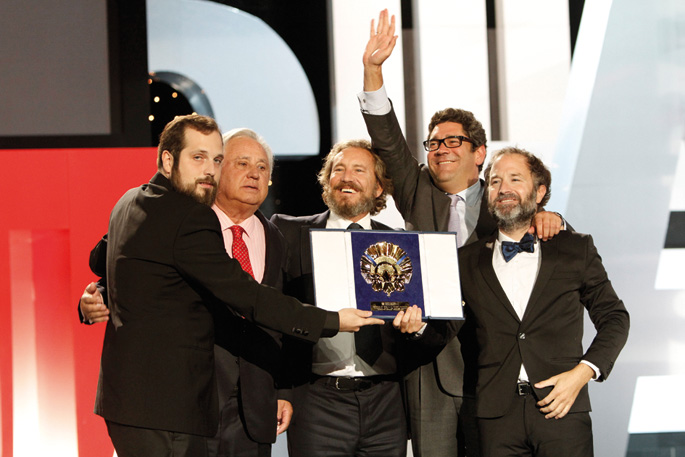Muñoz and Bengoetxea, three films that have created expectation
- Lasa and Zabala, Negotiator and Flores. Ane Muñoz Mitxelena and Josean Bengoetxea have collaborated in the three films that have aroused interest and that we will be able to see at the San Sebastian Film Festival, in script and as actor number two. In addition, they have also participated in two other works that will be premiered at the Festival: It was bought in Zarautz by Muñoz in the play The Fools and the Stupids of Bengoetxea.
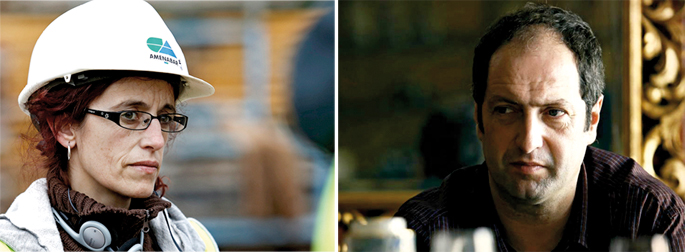
Lasa and Zabala, painful account
“These kinds of reviews give me a lot of respect and I’m interested in where you count. In other cases, when the same topic has been touched upon, I have refused, because I am not prepared to imagine a Basque Country in which there are only bad and good, and almost all eat angulas. On this occasion, however, I read the script and saw it clear, it is also well told dramatically and narratively and all the suffering that the protagonists suffered I have seen well reflected in the script and in the shoot”, tells the actor Josean Bengoetxea. The director Pablo Malo added that she has decided to run the event in a hard and unpolished, raw way, and so she has also experienced the shooting: “There have been painful scenes and that violence has been broadcast in the shooting, it has been very hard, I have been excited at many times, I have also felt pain and it is a good sign, because if I have been excited with the cameras and the spotlights in front, that means it will be transmitted in the result. I was concerned how history would be approached, but it is a very well documented work, done very carefully, the team has met with relatives, and those who have come to see the shoot, those who have lived closely what happened (sisters of Lasa and Zabala, Iñigo Iruin, Pako Etxeberria...) have told us that we were fine, it is an important guarantee”.
Muñoz is also a director, but he has worked as a script in these films. That is, to avoid filming errors, you have to be attentive and about details, identify and send each plan to the assembly, take into account what is before and after each scene. In summary, care for memory and consistency in filming, accompanying the actors and the director in case of need for advice.
For his part, Bengoetxea, in addition to playing a secondary role in this film, has had to perform a job he had never done before: He trained the actors Jon Anza (Lasa) and Christian Merchan (Zabala). “The development of the film is intense; they are two adventurers at first, after two young people suffering torture, and two friends who end up seeing death face to face. There are also hard scenes, because Paul was clear that you couldn't give a superficial picture, that you had to explain the torture, and that's hard to work with the actors, because we haven't seen each other in that situation, but I put them in a room and helped them to find emotions, to free up the taboos that each one has."
In view of the police record, we have asked them whether the film is going to be the subject of controversy. They have told us that there is a distance from what happened and that it is other times. Although there will be criticism conditioned by political ideology, Bengoetxea hopes that the issue will not be eaten up and that the film itself will prevail. Muñoz has recalled that many people implicated in history are still alive, “it is a told story alive, free and without fear. However, rather than controversy, it will cause pain and anger because of the facts, but that pain is necessary.” However, both have emphasized that this is a non-documentary version of fiction.
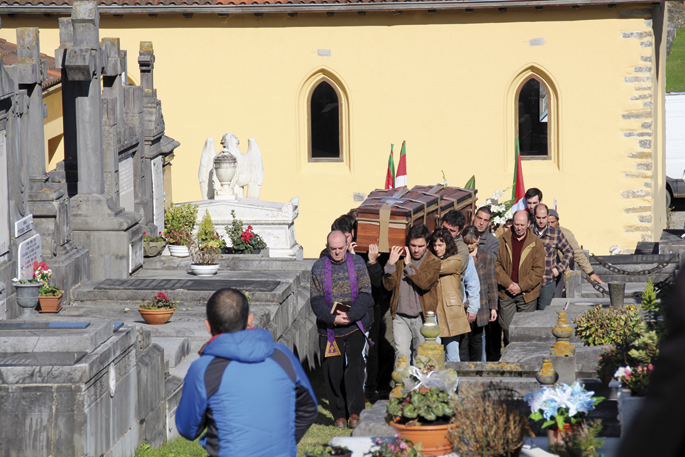
Negotiator, Finnish humour in the Basque conflict
In Bengoetxea’s view, the work of the Borja Cobeaga Negotiator can generate more controversy than Lasa and Zabala, “especially because we have many prejudices.” Following talks between Jesús Egiguren and ETA members Xabier López Peña ‘Thierry’ and Josu Urrutikoetxea in 2005-2006, the Donostia director has approached the issue with humor. “When Borja explained the issue to me and told me that I was going to deal with it with humor, I got a terrible fear – Ane Muñoz has acknowledged – but I think he has succeeded in the tone. In the end, he talks about anti-heroic, and even if he was inspired by Egiguren, he might have been someone else, in another context: in short, it's the story of a poor man who wants to solve a problem. It may be a courageous proposal, but it does not intend to ridicule the political conflict.” The director has defined what he's doing in the film as a Finnish humor, and Muñoz says it's a sympathetic story, not to burst into laughter. Although the famous 8 Basque surnames was Cobeaga’s screenwriter, “it has nothing to do with him, it is based on topics 8 surnames, and this has a more serious tone, it is not a collection of sketches or jokes.”
In addition, Josean Bengoetxea said it is a melancholic, subtle, gray humor: “Introduce a lot of silences, let it breathe, and that’s very useful for the characters to find out.” The actor has been asked if he sees the humor to tell stories of this kind – he himself has performed a character inspired by Josu Urrutikoetxea. “Why can’t you use humor? Humor is one of the strongest weapons out there, as much as provocation. While we respect the characters and the story… People in Egiguren’s ideological environment seem to be worried about the film, but he doesn’t have that worry, it’s an exaggeration everywhere, he hopes the film will give him a better picture. On the other hand, we Basques know how to laugh at ourselves and on this issue we still need a point of therapy, humor.”
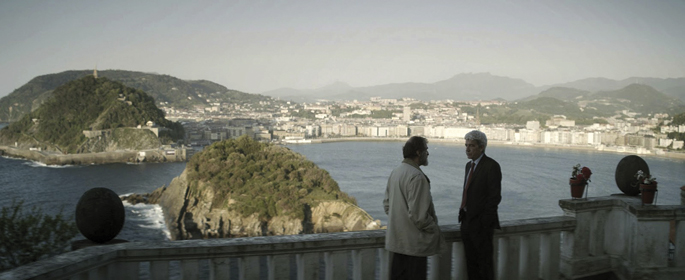
From sensitivity
We talked a lot about the LOREAK film, but we wanted to know what it's like to work under two directors. The atmosphere in the Garaño and Goenaga rodaks is very familiar, accompanied by the team of always. Being two directors, they do not always agree and have debates, “but we who know we see them with humor,” says Bengoetxea. In the words of the actor, it is a couple of great sensitivity; “they are very elegant, some phenomena”, added the script.
Competing in the Official Section of the Zinemaldia is not a goose fool. Bengoetxea does not believe that “a film has to be in the Official Section because it is in Basque, it has to be because it is good, and Loreak is worth being and I am convinced that the festival’s programmers liked it a lot.” It is a joy for the normalization of Euskera, as, according to Muñoz, it shows that Euskera is as appropriate to tell stories as any other language.
Flexible and rigid directors
Ane Muñoz has also worked as a script in the short film purchased by Aitor Arrangi in Zarautz. The film, which will take part in Zabaltegi, focuses on the concern and obsession of Nagore Aranburu, the protagonist of the film, as a result of a stupid anecdote: “It’s a small piece, made by a small working group, but with great pleasure.”
Bengoetxea is one of the main actors of the film The Fools and Stupids to be projected in the New Directors section of the New Directors section. In this particular theatrical comedy – the argument is a script reading of the actors – the family model and loneliness are the main themes. Directed by Roberto Castón, co-author of the beautiful film Ander, has not received funding on this occasion, so it is a cooperative project in which the actress has been fully involved. “In the days before shooting, Castón exercises as a psychologist with us, analyzes the story and how we have assimilated the character, and then, in shooting, gives us a lot of freedom, trusts us and often feels that he does not direct you. We two, moreover, have the same point of humor and we just look at each other to understand each other; he says that I am his muse. Other directors are more inflexible with aesthetics, history and actors. For example, Jon [Garaño] and Jose Mari [Goenaga] are quite strict, because they are very clear about what they want; Borja [Cobeaga] is more open. I myself, when I receive very specific orders and they mark me tightly, motivates me, because the more constraint you have, the more you have to influence creativity.”
They have no doubt: they are strong films, and they will be welcomed among the people, they are hopeful. The result, moreover, is plural. “We are prepared for all kinds of movies and genres; hopefully it will prove that here we have our school and that we can make movies as good or better than those that come from the other side of the world and that we have done them,” Muñoz says. Bengoetxea is also clear that in Euskal Herria there are great workers, artists and technicians, so “that you realize what needs to be done, that there is industry and that you have to put the means to keep that whole level at home. On the contrary, look at how the main engine of audiovisual production (EITB) stands.”
Bukatu da Donostiako Zinemaldiko 62. edizioa eta palmaresak utzi duen zaporeak badu zerikusirik espektatibekin. Ez da gauza bera Sail Ofizialean eskubide osoz sartu zarela pentsatuta joatea edo egotea bera garaipentzat hartzea.
Euskal Herriko ekoizpen onenaren saria irabazteko faboritoa Loreak bazen ere, Borja Cobeagaren Negociador lanak lortu du garaikurra. Eta zur eta lur geratu gara, xinplea iruditu baitzaigu Negociador, Josu Egiguren PSEko lehendakariak ETAko kideekin izandako elkarrizketetan... [+]
Bazkalosteko siesta dramatizatzeko jartzen duten telefilm horietako baten tankera hartu diot Vie sauvage ekoizpen frantziarrari. Semeak bahitu eta hamar urtez inguru urbanoetatik kanpo heziko dituen aitaren istorio ahul xamarrarekin bukatu da Sail Ofizialean lehian ziren... [+]
Intuchables arrakastatsuaren zuzendariek itxi dute Sail Ofiziala, immigrazioa bezalako gai konplikatuarekin tragikomedia bat eginez.
Banatu dira Donostiako Nazioarteko Zinemaldiaren 62. edizioko sariak. Magical girl film espainiarrak irabazi du Urrezko Maskorra eta La isla mínima, espainiarra hau ere, izan da sari gehien jaso dituen beste lana.
Krisi ekonomikoaren aitzakian egindako eskubide sozialen murrizketak eta horiek gizartean sortzen duten ezinegona dira Isaki Lacuestaren Murieron por encima de sus posibilidades filmak komedia zoro bat egiteko probesten dituen lehengaiak.
Danis Tanovic-ek film bakarra baino, bi ekarri ditu Sail Ofizialera: Tigers salaketa pelikula bat da eta salaketa pelikula bat egiteko zailtasun legalei buruzko filma ere bai.
Pablo Escobar narkotrafikatzaile ospetsua, eta Benicio del Torok berau nola irudikatu duen ikustea dira Escobar: Paradise lost pelikularen amu zinematografiko eta komertzial nagusiak. Baina ze pena, bigarren mailako pertsonaia da Escobar, pelikulako gaizkilea, eta hain figura... [+]
Lasa eta Zabala hasten den moduak konbentzitu nau gutxien, baina filmak aurrera egin ahala errealismoan eta gordintasunean irabazten du.
Umore beltza, oso beltza, dario Relatos salvajes filmari. Gizakion oinarrizko instintuak muturrera eramaten ditu zuzendariak, jolas gisa. Jolasa baita Relatos salvajes, istorioaz gaindi baita jolas narratibo eta estetikoa ere. Jolas sarkastikoa, biolentoa, esajeratua. Oso... [+]
Aurreiritziekin sartu naiz Magical girl ikustera, film luze bat lehen aldiz zuzendu duen Carlos Vermut Sail Ofizialean egotea festibal honek nazionalismo zinematografiko espainiarrari egiten dizkion kontzesio horietako bat izango zelakoan. Baina nahiko gustura ikusten den... [+]
Eden 1990eko house musika frantziarraren inguruko filma da, gaztetan DJ lanetan hasiko den pertsonaia baten ibilbidea jarraitzen dena, fama pixka bat lortu eta gainbehera hasi arteko 15 bat urteko tartean.









